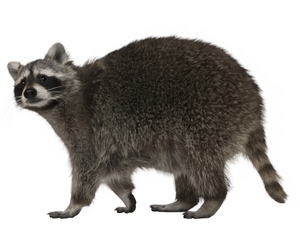How to Identify Raccoons
Raccoons are as common on city streets in all five boroughs as they are in the Long Island suburbs. Raccoons are nocturnal wild animals with grey fur and distinctive markings of alternating light and dark rings around its tail and a dark mask-like area over its eyes.

THE SIGNS OF RACCOONS
Raccoons are active all year round but make take cover or den over periods of severe cold or snowy winter weather.
Raccoons are omnivores. They eat both plants and smaller animals like crayfish, fish, frogs, and sometimes grown nesting birds and rabbits.
Raccoons make dens in hollow trees, ground burrows, and brush piles. Although generally thought of as a rural woodland animal, the population of raccoons has grown tremendously in suburban and urban areas of New York in recent years, due to the easy access to garbage. People leave food out for raccoons to feed upon, making the once shy raccoon comfortable around people and their surroundings.
THE RISKS OF RACCOONS
People in suburban areas are familiar with the damage raccoons can do to their vegetable gardens, and the damage that can be done to a structure can be extremely formidable. Due to the raccoon’s size, strength, paw structure, and grip, raccoons can and have ripped shingles and fascia boards off of building facades, torn vents off to access attics spaces, and destroyed interior walls. Once inside, raccoons can further destroy interior spaces with urine and fecal matter. Besides the noises they make and the objectionable odors, raccoons are host to a wide range of parasites such as fleas, mites, and ticks that are vectors of health problems in their own right. Raccoons are also known carriers of other diseases including roundworm and rabies and are known to bite.
Health Risks
Contamination
May Be Aggressive
Raided Trash Cans
How WE KNOCK OUT RACCOONS
Raccoons are a formidable pest for an untrained individual to deal with. Raccoons are powerful and can be dangerous. A sickly raccoon may have Rrabies which can make the animal vicious and extremely aggressive.
A Knockout Pest Control Technician knows the biology and habits of raccoons. They are highly trained in their removal, whether it is one or an entire den of many. We can properly identify the pest, how to evacuate their hiding places, and when and how to catch/trap them. Once removed, our Certified Technicians can discuss all the means necessary to prevent re-entry into your residential commercial space, which could include dealing with trash, clearing brush, trimming tree overhangs near structures, and rethinking arbors/trellises against buildings.
Get Rid of Raccoons Fast
Call 1-800-244-PEST (1-800-244-7378)
We respond like every pest problem is an emergency with fast, 24 hour service seven days a week.

